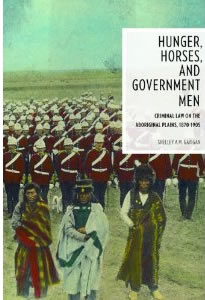by Shelley Gavigan, Professor, Osgoode Hall Law School. Published with the University of British Columbia Press, 2012.
Shortly after Confederation Canada acquired the territories formerly owned and administered by the Hudson’s Bay Company. Among the formidable challenges brought by this massive land acquisition, the most notable was the task of reconciling the aboriginal peoples of the plains to Dominion sovereignty. Much has been written about the treaty making process of the 1870s, and about the metis resistance of the late 1860s and 1880s, but we know relatively little about the introduction of Canadian legal regimes. Professor Gavigan fills that historiographic gap, examining in considerable detail the introduction of Canadian criminal law and criminal justice institutions in the prairie west after 1870. Using newspapers, penitentiary records, Indian department files, and, principally, the records of stipendiary magistrates, she shows the law’s impact on the aboriginal peoples of the west, as well as their use of it in coming to terms with the new political reality.
The book was awarded an honourable mention for the John A. MacDonald prize, 2013, given for the best book in any field of Canadian history.” It also won the 2013 Clio Prize for the Prairie region from the Canadian Historical Association and an honourable mention for the 2103 Canadian Law and Society Association Book Prize.


